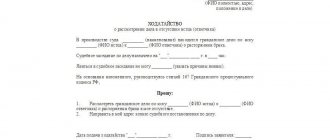Inheritance – joint or personal property?
During their life together, spouses acquire ownership of various household items, furniture, vehicles and even real estate. During marriage, property is exploited jointly or by one of the spouses by mutual consent. The question of belonging is often not raised. The exception is the situation when citizens want to dissolve a family union.
The division of property owned by spouses depends on the following conditions:
- is the object personal or common property of the parties;
- whether a marriage contract has been drawn up?
All property is divided into personal and joint. Personal objects include:
- received under a gift agreement;
- inherited;
- received through gratuitous transactions;
- personal belongings;
- personal compensation (for compensation for damage to health);
- purchased before the official registration of marriage;
- copyright;
- purchased during marriage with money that is personal property, or with funds from the sale of premarital property.
Items that spouses purchased during the official marriage with common funds are considered joint property. General means mean:
- proceeds from the sale of common property;
- income from work;
- funds received on credit with the consent of the second spouse;
- payments from the state (compensations, pensions).
Important! According to the law, personal property is not subject to division during a divorce. The common property is divided between husband and wife in equal shares.
Is inheritance considered joint property? In general, no. The exception is the situation when the parties have entered into a marriage contract or agreement in advance on the allocation of shares. In the contract, citizens can determine any ownership regime for their property. The divisible property may include both personal and common property of the parties. With the consent of the heir, the second spouse may receive a share in the inherited property.
Apartment as a gift. Is the donated apartment divided?
Donating an apartment is a gratuitous transaction in which the donor transfers the apartment into the ownership of the recipient without any remuneration on his part. Most often, close relatives - parents, children, grandparents - prefer to give such valuable gifts. If the apartment was received as a gift from a relative, you do not have to pay tax. If the apartment was donated by a stranger, the recipient must pay a tax to the state - 13%. You will have to pay the tax again if you sell an apartment received as a gift, if it is sold within 3 years from the date of receipt of the gift (Article 217.1 of the Tax Code of the Russian Federation).
An apartment received as a gift by a husband or wife is his personal property. Moreover, it does not matter whether the apartment was donated before marriage or during the married life of the spouses - the gifted apartment is not subject to division in the event of a divorce. Even if during family life the second spouse was registered in the spouse’s personal apartment, even if he lived in it for many years, after the divorce, the owner of the apartment has the right to evict the spouse from it - by virtue of clause 4 of Art. 31 Housing Code of the Russian Federation.
However, there are exceptions. You should consider the situation when the apartment is given to both husband and wife at the same time. For example, a young family is often given housing as a gift for a wedding. Of course, in this case, no one even admits the thought of a possible divorce, so ownership of the property is registered in the name of two spouses . In this case, the donated apartment is common, and during a divorce it will be divided between the spouses into equal shares (see “What is considered jointly acquired property during a divorce”).
Be sure to read it! Order to work on a day off
Is inheritance divided during divorce?
Property inherited/received as a gift is the personal property of the spouse. It is not divided in a divorce. But sometimes exceptions are possible.
There are two ways to receive an inheritance after a deceased relative:
- according to the will,
- according to the law (or in order).
Both methods are free transactions. The inheritance received as a result will be considered the personal property of the spouse. It doesn’t matter whether a relative bequeathed to him an apartment, a car, money..., or all this went to him by law, as the heir of the first, second or third order.
Division of inheritance during divorce is not allowed. This is regulated by part one of Article 36 of the Family Code of the Russian Federation, since such property will only be the property of the heir-spouse, and the wife or husband will no longer be able to lay claim to it.
The same applies to the donation procedure. Since common funds from the family budget were not spent on such a procedure, the donated apartment cannot be divided during a divorce.
When can a spouse claim a division of inheritance?
Is inheritance considered joint property? As a general rule, no. However, the Family Code provides for a number of exceptions to this rule.
The second party could significantly increase the value of the inherited property by:
- personal funds;
- own labor.
In this case, the object may be included in the list of divisible property. To do this, you must file a claim for inclusion.
The general rules of the section do not apply to him. In most cases, the court will decide to assess the value of the property. The original price of the property is subtracted from the amount, and the remainder is subject to division.
As a general rule, spouses, regardless of employment and contribution to the family budget, have the right to receive ½ share in the common property. Therefore, when dividing an improved object that was inherited, only the cost of the changes is subject to division.
The initial price of the object is determined by the certificate of inheritance. At the time of inheritance, the recipient must evaluate the property of the deceased. This is necessary to calculate the notary fee.
Is inherited property divided during a divorce? It depends on the specific situation. Since property claims are considered by the court after paying a significant fee, it is advisable to first consult with a lawyer. A specialist will review the document and evidence and advise whether it is worth claiming a share in the spouse’s inherited property.
Not subject to division
Do you know that
In the event of a divorce, a spouse who has increased its value during the marriage and made a large financial contribution to its improvement and maintenance can count on part of the inheritance.
In other cases, when the spouse who is not an heir did not participate in any way - neither financially nor physically - in the improvement and improvement of the property inherited by the other spouse, then he will not be able to have rights to a part of it in the event of termination of the marriage.
This especially applies to funds received as an inheritance. The second spouse will not be able to claim them. This is the purely personal property of the heir. And even if they were in a savings bank account or were received in the form of shares, and during the marriage the amount of money increased significantly, they still will not become joint property.
How to divide inheritance during divorce?
Is inheritance divided during divorce in Russia? In accordance with the legislation of the Russian Federation, the owner has the right to independently determine the fate of his property.
The Family Code provides for the following options for the voluntary division of property between the parties:
- marriage contract;
- agreement on the allocation of shares.
Attention! Verbal agreements are not taken into account. The parties must execute a formal document. The law requires a notarial written form.
When the heirs are both spouses
There are cases when spouses can receive an inheritance together. Accordingly, it will belong to both, and during a divorce they will have to divide it in half
If both spouses became heirs after their deceased children (or other relatives, etc.), then in the event of a divorce, each of them will claim only their part of the inheritance. The division of the inheritance during a divorce will occur in such an order that first each of them must enter into inheritance rights, and then the shares of both will be recognized as the personal property of each of them.
If you still have questions about how to divide the inheritance during a divorce, then ask them in the comments
Marriage contract
The agreement concluded by spouses to determine property issues is called a marriage contract. It can adjust:
- the issue of division of property during divorce;
- the procedure for liability to creditors;
- alimony obligations between spouses after divorce and during marriage;
- a list of property items that are part of the personal property of each party;
- a list of citizens’ incomes that are part of the common property;
- rules for paying general and personal debts;
- other property issues at the discretion of the parties.
Other issues may include special conditions. For example, a man transfers 1 million rubles to his wife in the event of the birth of a son.
The contract cannot include personal relations between the parties. For example, spouses cannot document cleaning rules.
The contract should not include marital dispositions in the event of death. To do this, you need to draw up a will. The document cannot reflect the conditions for communication with the child, the procedure for financial support for minors and adult children.
The parties have the right to draw up a contract before the marriage and at any time during the marriage. If, after concluding the contract, the parties decide to refuse to enter into marriage, then the document simply does not come into force. Special conditions may include orders regarding objects that have not yet been acquired.
Important! A contract concluded during marriage comes into force from the moment of notarization, or at another time specified in the document. If the parties entered into a contract before marriage, then its validity begins from the moment of marriage.
Changes and additions can be made to the document. They are formalized in written notarial form.
In the event of a divorce, is inherited property divided in the prenuptial agreement? This issue is resolved at the discretion of the parties.
What are the exceptions to property received under a will?
Inherited property is divided during divorce in two cases:
- If there is an agreement or marriage contract between the spouses.
- When the court recognizes such property as common property on the grounds strictly defined by law.
Below we will look at whether it becomes possible to divide inherited property to which significant improvements have been made, how the contractual management of inherited property occurs, and what happens if both spouses are heirs.
Property improvement
Although the grounds for dividing inherited property during a divorce can also apply to movable property (for example, a car), to a greater extent they still relate to real estate (for example, an apartment).
By virtue of Art. 37 of the Family Code, property received by inheritance will be the joint property of the spouses and is subject to division if:
- At the expense of the funds or property of one of the spouses, major repairs were carried out on the inherited property;
- during the marriage (i.e., at the expense of jointly acquired property), a significant improvement was made to the property received by inheritance;
- the husband or wife, through their labor, reconstructed the inherited thing or otherwise improved its characteristics.
The main basis for recognizing inherited property as joint property is a significant increase in its value due to the investment of the spouses' common funds. At the same time, the legislation does not provide specific criteria determining what kind of increase can contribute to the recognition of property as joint. This issue is decided in each specific case at the discretion of the court.
Practical examples include the sale of a personal apartment by one spouse in order to carry out major renovations of the personal apartment of the other, the investment of financial resources in the renovation of the spouse’s apartment in the amount of half of its market value, etc.
Contractual property management
In a way other than what is prescribed by legislative rules, inherited property during a divorce can be divided in the case where the marriage contract, or contract, as it is also called in practice, provides otherwise (you can read about the preparation and conclusion of this document in our article “How to draw up prenuptial agreement or marriage contract (sample)").
Be sure to read it! How to quickly divorce your wife or husband: descriptions of the process
In particular, a marriage contract may contain a provision that any property that comes into the ownership of the husband or wife during the marriage, including through paid and gratuitous transactions or by inheritance, is the common property of the spouses.
In this case, it is worth keeping in mind clause 3 of Art. 42 of the RF IC, according to which a marriage contract cannot include provisions that a priori place one of the parties in an extremely unfavorable position. Read more about the prenuptial agreement below.
- If a marriage contract has been concluded
Before marriage (or directly during the ceremony), spouses can enter into an agreement between themselves, which will regulate both very everyday aspects of life and the right of ownership of various property. The text of the agreement directly depends on the goodwill of the spouses. It may include division points, including personal property.
Example: The marriage contract states that upon divorce, the husband takes 70% of all property of either spouse, including personal property. According to the same rules, 30% of the remainder goes to the wife. Thus, even an inherited apartment will be subject to division.
Voluntary section
The legislator allows spouses to independently determine the procedure for dividing property acquired by them during marriage. In accordance with the provisions of the RF IC, for this purpose spouses can formalize:
- Marriage contract (Article 40 of the RF IC). It is understood as an agreement between the spouses that determines their property rights both during the marriage relationship and after its termination. This agreement must be concluded in writing and certified by a notary (Article 41 of the RF IC). You can conclude an agreement at any time - both before the formalization of the relationship (in this case, it will come into force from the moment of marriage), and after. Adjustments can be made to the contract, and if during its validity one of the spouses receives an inheritance, the procedure for its division in the event of a divorce can also be fixed in the contract. If the heir-spouse does not express such a desire, the owner of the inherited property during a divorce will be determined by law (that is, the property will not be divided - the sole owner will be the spouse who received such an inheritance).
- Agreement on the division of common property (Article 38 of the RF IC). It can be drawn up at any time during the marriage or within 3 years after its dissolution. Like a marriage contract, such an agreement is drawn up in writing and certified by a notary. In it, spouses can record a list of property that each of them will receive upon divorce. In addition to jointly acquired property, which by law must be divided in half, inherited assets may also be included in the list of values subject to division.
How is the inheritance divided if both spouses are heirs?
There is often a situation where divorcing parents become heirs together. This happens when valuable goods (cars, real estate) are left behind from dead children.
If property is transferred to spouses on the basis of law, then it is divided in half upon divorce. If the inheritance occurred according to a will, then it indicates the share passing to each person.
From the moment when each spouse enters into the right of inheritance, the received values become his personal property, which is not subject to division after the dissolution of the marriage. That is, after a divorce, the spouses retain the right to inherited values.
Property division agreement
The agreement is the second option for the voluntary division of joint and personal property of the parties. A prerequisite for division is that at least one of the spouses has ownership rights to the property. The agreement cannot provide for the division procedure for objects that have not yet been acquired by citizens.
The document is drawn up in writing. It cannot be concluded before marriage. This type of division is intended exclusively for spouses and former spouses.
The law establishes the possibility of concluding an agreement during the marriage and 3 years after its dissolution. A prerequisite is that the terms of the document are voluntary. If one of the parties has contradictions, its registration is impossible.
The statement of claim for division of property can be downloaded here
If the parties have entered into an agreement, then the property cannot be divided in court. The exceptions are the following situations:
- the document was concluded against the good will of the spouse;
- the property contains objects that do not belong to the parties;
- the citizen entered into a document under threat of violence or in a state in which he could not understand the consequences.
The agreement does not include conditions regarding the property. The document cannot provide for payment for the wife in the event of the birth of a child and the citizen’s obligation to make loan payments.
Voluntary division of inherited property
According to Art. 38 of the RF IC, spouses have the right to enter into an agreement on the division of property before, during or after divorce. The parties independently determine what property is included in the agreement.
The spouse who inherited real estate or other valuables has the right to transfer them to the other party by agreement. The origin of the transferred property does not matter in this case.
It is important to consider several factors:
- notarization of the agreement is required;
- without specifying a date, the contract comes into force at the moment of signing;
- the agreement does not indicate the property belonging to the children: it is not subject to division.
Documents for a notary
To complete the transaction, passports, ready-made copies of the agreement, and property documents are provided to the notary's office. If the parties cannot draw up an agreement on their own and legal assistance is required, they can order a service from a notary. It is paid separately.
When the inheritance is divided
Although the general procedure does not provide for the division of inherited property upon dissolution of a marriage, in individual cases such a possibility is provided. Let us consider in more detail in what situations the inheritance is divided during a divorce.
- The husband inherited the apartment during the marriage. Using joint funds, the apartment was renovated, which doubled its value. In case of divorce, a woman has the right to demand that the apartment be recognized as joint property. The court will only divide the cost of improving the property. To prove a significant increase in value, it is advisable to conduct an independent assessment.
- The husband inherited a plot of land. At the expense of his wife, a country house was erected on the site. Using common funds, the couple installed water and electricity. In the event of dissolution of the union, the land plot will be divided by the court into ½ share of each party.
- The husband inherited an apartment. He sold it. The funds were spent for general family purposes. After a long time, a married couple bought a car with part of the money. Since the man cannot prove that the vehicle was purchased with personal money, the car will be considered the common property of the parties. In case of divorce, it is subject to division.
- The husband inherited a car. He gave it to his wife. But the donation agreement was not formalized. In the event of a divorce, the man can take the vehicle back, even if the woman proves that the car was primarily in her use.
An inheritance in a divorce can be divided if the other spouse invested in it and improved it through his actions. Funds received for the sale of inherited property are considered the personal funds of the recipient. But it is necessary to prove what exactly the spouse received for the sale of the inheritance. To do this, they need to be stored in bank accounts. To avoid an unplanned division of inherited property, spouses must enter into a prenuptial agreement.
An inheritance that cannot be shared
Not only property can pass from a deceased person to an heir. Inheritance includes some non-property rights. Not all inheritances can be divided after divorce.
There are things that are indivisible:
- Financial obligations of the testator (debts, loans);
- Property that one of the spouses did not improve, did not invest money in its development, etc.;
- Copyright.
It is difficult to prove in court your right to the above material benefits, especially when it comes to copyrights. Only the heir remains the owner without restrictions or exceptions.
Often money or assets - stocks, bonds - are inherited. It is difficult to sue their share from the spouse. Even if the amount was deposited in a bank and interest was added during the marriage. Only the heir can own and manage the money. The only option for division is a voluntary agreement between the parties.
Division of inherited property during divorce
The civil legislation of the Russian Federation is quite transparent regarding property received by a person by right of inheritance. In this case, a gratuitous transaction takes place, and the presence of a will or legislative decision does not matter. In any case, a person becomes the owner of property, which may not legally be shared with the former spouse as a result of divorce.
In this situation, several fundamental points can be identified that relate to the situation and can explain it:
- a person becomes an owner after entering into inheritance rights;
- the spouse cannot claim such property;
- all this is regulated by articles of the Family Code.
There are particulars that can allow the opposite party to express claims regarding inherited property. First, the owner himself can transfer property to his husband or wife on a voluntary basis. Secondly, as mentioned above, the property can be repaired, repaired or restored, and the money invested in the process could belong to the other spouse. In this case, the property loses its status and the sole owner.
We cannot exclude a situation where, by mutual agreement, property received by inheritance was sold for the purpose of acquiring benefits or improvement. Let's explain with a specific example:
- a husband or wife inherits a plot of land;
- at the family council, a decision is made to sell it in order to buy a larger land holding (the location or area is not suitable);
- the purchase of a new plot was accompanied by an additional injection of funds not only from the owner of the inheritance.
In fact, the newly acquired plot is jointly acquired property, which both spouses can claim equally in the event of a divorce. In any case, the court's initial opinion will help draw up a documented agreement, if present.
Rules for dividing inheritance
As already noted, an inheritance can be received by a citizen in two ways:
- In law. The legislation identifies a certain circle of persons from among family members and close relatives of a citizen who may be heirs. The order of priority for receiving property is also established - the heirs of each subsequent degree have the right to claim it only if there are no previous ones.
- Based on a will. In this case, the owner independently identifies a circle of persons who will be able to receive the property belonging to him after his death. This is secured with the help of a special document - a will. It must be in writing and certified by a notary.
Regardless of which of the listed methods the property was obtained, it is equally not subject to division between spouses during a divorce. In this case, the norm established by Part 1 of Art. 36 IC RF.
However, there is a certain exception to this rule, also established by law, namely Art. 37 RF IC.
In accordance with this article, inherited property can be divided if the second spouse (not the heir) has invested significant funds in its improvement, as a result of which its value has increased significantly.
In this case, the invested funds can be both material (money, building materials) and intangible (time, effort).
There are several examples:
Example 1
The wife inherited a small house outside the city, the estimated value of which was 50 thousand dollars. Over the course of three years of marriage with her husband, they were engaged in the improvement of this house: they changed the doors, double-glazed windows, made repairs in all the rooms, and restored the outside. As a result of all this, the cost of the house increased to 90 thousand dollars. In this case, during a divorce, the husband will be able to claim half of the housing, since his contribution to its arrangement was very significant.
Example 2
The husband inherited an abandoned plot of land worth 10 thousand dollars. Over the next few years, the wife took care of this area: she cleared it of debris, weeds, old bushes, fertilized the soil, and planted many new plants. After all this, the plot could fetch about 20 thousand dollars. Therefore, during a divorce, she will be able to claim half of this money or the plot itself.
Example 3
The husband inherited an apartment and sold it for 100 thousand dollars. Afterwards, part of this money (about 30 thousand) was spent on some current expenses, another 40 thousand was given to the joint children of the spouses. The couple invested the remaining 30 thousand in the construction of the house, which had begun even earlier. In this case, the built house will be divided according to general rules, although funds from the inheritance were spent on its construction. However, if the husband had fully invested the proceeds from the sale on the purchase of other property (apartment, house, car), it would only have been his personal property.
In these and similar cases, the second spouse has a significant chance to divide the property as prescribed by law (that is, in half). However, to do this you will have to go to court and prove your case, confirming all arguments with documentary evidence or testimony of witnesses. It is also advisable to seek help from an experienced lawyer, whose participation in the case will significantly increase the chances of a positive outcome.
As for property inherited before marriage, it will be almost impossible to divide it. This is due to the fact that any property acquired by a spouse before marriage is his personal property and belongs only to him, regardless of the method of obtaining it. However, if there is a significant improvement in such property, and the second spouse can prove that he took part in this, it will also be possible to try to divide it in court.
Determining the place of residence of children during a divorce can be decided either by “peaceful” agreement of the spouses or in court. Don't know where to start dividing property during a divorce? Read our article, it has answers to all your questions.
When dividing jointly acquired property, it is often required to have it assessed by independent experts. More information about this procedure can be found here.
Is inherited property divided between former spouses during a divorce?
Marriage occurs under different circumstances. The main expectation of almost any citizen who agrees to officially join a family is a long life together with the accumulation of valuable property, housing and other property. But disagreements or simple fatigue from relationships are quite capable of provoking not only a difference of opinion, but also the official termination of family relationships - divorce.
Everything obtained through a long, painstaking process - earned, acquired - is divided, according to the articles of the Family Code, into equal parts between the spouses. When those getting married prefer a relationship with a stable, documented trust, they can enter into a marriage contract that transfers the marriage under the jurisdiction of the Civil Code.
In addition to what was acquired and bought during the process of building a family, spouses can receive something by inheritance from relatives or third parties. We are talking about different things:
- real estate (residential, non-residential);
- transport;
- valuables, jewelry;
- household items;
- antiques.
All this may have one or another value, which will later become quite important if you need to divide something between separating people. To clarify the state of affairs, the Civil Code is used, which clearly draws the line between different types of property:
- received by right of inheritance by one of the two spouses during their marriage is not subject to division upon divorce;
- if changes have occurred to the inherited property, such property changes its status from “inviolable” to being considered for division.
What kind of changes do you mean? This is a repair or restoration with the investment of your own funds. Moreover, if the funds were spent by a spouse who has nothing to do with the inheritance, then he has the right to claim ownership of this property, including during division regarding divorce. It is worth paying enough attention to this topic so that no misconceptions are created. What can be divided during a divorce, what remains inviolable?
What can be an inheritance?
Regulation of gratuitous transactions, including inheritance, is carried out by another document - the Civil Code of the Russian Federation. In accordance with Art. 1112 of this document, inheritance can be understood as any property expressed in both tangible and intangible form. In the first case it could be:
- money (cash, non-cash, electronic);
- shares and other securities;
- real estate (garage, house, apartment, room or share thereof);
- land plot;
- vehicles (car, yacht, boat, helicopter, etc.);
- furniture that is in the housing;
- large and small household appliances (computer, refrigerator, TV);
- jewelry;
- clothing and shoes;
- Pets.
Intangible property may be:
- audio recordings;
- literary creativity;
- video materials;
- various types of intellectual property.
In addition to the listed property, the debts of its owner, in particular credit obligations, can also be inherited.
Moreover, the heir can refuse to receive them only on the condition that he will not inherit everything else either.
It is also worth considering that in order for certain property to become an inheritance, several mandatory requirements must be met. First of all, the testator must himself have legal rights to it. In some cases, this must be documented.
The next requirement is the existence of rights to receive inheritance on the part of potential applicants. These can be either family members or relatives of the deceased (if inheritance occurs by law), or persons designated in the will (if the transfer of property is carried out in this way). Each of these cases has its own legislative characteristics.








